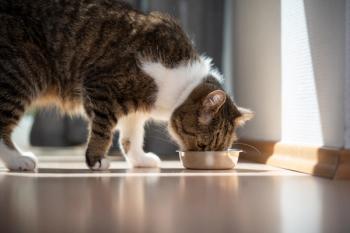
Compounding the issue
Know legal issues, regulations, reputation of pharmacy before compounding drugs; ultimate responsibility is yours
The last five years have seen a tremendous increase in the amount ofcompounded drugs used in veterinary medicine.
Almost every veterinary hospital refrigerator door has a selection ofadvertising magnets from a variety of compounding pharmacies, and flyersarrive in the mail weekly from businesses offering generic versions of the major equine drug preparations.
These compounded products are often less expensive and are offered inmore different forms (liquids, pastes, injections) than the currently availableproducts. Want injectable clenbuterol? Want a generic ivermectin? Want apeppermint-flavored, once-daily oral antibiotic? Compounded drugs offerconvenience and profit, so what's not to like?
Buyer beware
Dr. Joseph Bertone DVM, MS, diplomate ACVIM, and former Food and DrugAdministration veterinarian, urges all practitioners to take a strong lookat the use of compounded drugs in their practices and to educate themselvesas to the legal issues involved.
He advises that many pharmacies are not what they seem and that thereare potentially serious problems with the use of some of these formulations."Essential to rational therapeutic drug use," writes Bertone,"is a knowledge of the quality, strength (concentration), purity andavailability of the formulation we intend to administer."
When drugs and other products are purchased from major drug companies,it is the reputation of that company that the veterinarian relies on. Productsused in such a situation are expected to have been tested at some level,and production is expected to be controlled for issues of purity, strengthand quality.
Problems can and do still occur but the company accepts its share ofliability and generally the practitioner can be relatively certain thatMerial's Eqvalan for instance, will contain 1.87 percent ivermectin.
Drugs and other products compounded by a pharmacy do not come with thesame type of guarantees. A generic injectable glucosamine preparation maycontain 80 percent glucosamine or it may contain 90 percent. That glucosaminemay be 75 percent pure or it may be less than 25 percent pure and itsabsorption may or may not be as listed. It becomes crucial, therefore, forthe practitioner to trust the compounding lab that is being used and tounderstand the appropriate drug regulations governing specific states.
As Bertone advises, "It is judicious for veterinary practitionersto assume that they are ultimately responsible for the use of a compoundedproduct."
Regulation
Compounding of animal drugs is regulated principally by the FDA at thefederal level and by the pharmacy boards at the state level.
Some states require a pharmacy license before veterinarians can use compoundeddrugs.
The FDA regulates compounding through the Federal Food, Drug and CosmeticAct. Section 21, Part 530 of these regulations deals with "Extra LabelDrug Use in Animals". There is also another section of the regulations(Compliance Policy Guide 608.400) that specifically addresses "Compoundingof Drugs for Use in Animals." It is important that practitioners reviewthese sections and understand the legal responsibilities that arise fromthe use of a compounded product.
Patient's view
More important than the possible legal complications, at least from thepatient's point of view, is the potential difference in a compounded product'sstrength, purity and quality.
When treating a specific condition, many decisions often are influencedby the horse's response to treatment. If the compounding drug that youare using is weaker or more poorly absorbed than other "drug-company"products, then you may not be able to accurately evaluate a specific horse'sresponse to treatment. Did the infection not go away because that was notthe best antibiotic for this condition or because the compounded drug wasnot concentrated enough? Is the horse still lame because the specific treatmentdrug was inappropriate for this condition or because the compounded druglacked purity?
Questionable compounded drugs can completely destroy the practitioner'sability to treat many conditions.
Know the regs
If there are so many potential problems with compounded drugs, then whyare there so many pharmacies advertising?
In many instances compounded products are slightly less expensive thanstandard drugs. This difference in price may mean the difference in a horsethat would not be treated if the client had to pay the standard fee.
This decreased price is also seen as a profit source by some veterinariansin that they can pay less for compounded drugs. These drugs are then resoldto clients at a higher price.
This is a perfect reason to become familiar with the federal regulations.Those documents explain that it is illegal to increase a practitioner'sprofit margin by reducing the cost of the product.
"Practitioners can charge an appropriate handling fee," saysBertone, "but it is against the law to mark-up a compounded drug."
Many practitioners also use compounding pharmacies when they desire anexisting product in a non-available form. This is one of the best uses forcompounding.
Many horses do not tolerate the oral administration of certain drugs.An injectable form of that drug would make treatment easier and reduce stresson both the horse and the veterinarian. This type of compounding followsthe official rules which state that compounding may be done only when thereis no approved drug that, when used as labeled, will, in the available dosageform and concentration, appropriately treat the condition.
Ask questions
There are some ways to determine if you are dealing with a good compoundingpharmacy or not, and Bertone advises practitioners to ask these questionsand to verify the answers.
Is there a licensed pharmacist on staff? According to Bertone, "compoundingmay be legally performed only by a licensed pharmacist or veterinarian.These individuals have the training, and legal and ethical responsibilityto follow good compounding practices. Verify the state license number andlook for more than a loose association between the pharmacy and the pharmacist."
Does the company compound medications for the laymen without a prescription?
"A 'yes' answer to this one," says Bertone, "casts thatpharmacy in a suspect light."
That activity has been deemed unethical by most state pharmacy boards.
If bulk product is used to produce compounded formulations, are theraw materials of high quality?
Quality compounding pharmacies can usually produce certificates of analysis(CoA) for the materials used in the formulation. These bulk products shouldbe United States Pharmacopeia/National Formulary listed approved products.
Does the compounding company ship products interstate? Many states contendthat pharmacies may ship drugs interstate if the drug was prescribed bya veterinarian. Some pharmacies may be required to be registered in bothstates in order to ship drugs between them.
Does the pharmacy use an advertisement that goes beyond services offered?It is generally not allowed for pharmacies to advertise specific prices,though this issue is currently being debated. A good compounding pharmacy,however, should not need to engage in sensational advertisement to drawattention to it.
Benefits
Overall, compounding is a wonderful benefit to animal patients and providingdrugs in a more absorbable, palpable or acceptable form is truly a service.
This benefit is offset by the possibility that the compounded drug youmay use may not be as strong or as pure or as concentrated as you expected.If one is aware of these problems then compounding may be used when appropriate.
"Cheaper is not always better," says Bertone, "so a completecomparison of compounded drugs and standard formulations may be necessarybefore a choice can be made. If you are going to use compounded ivermectinthen you should do fecal examinations to ensure that you are providing yourclients with effective therapy. Compounded omiprizole use should be followedwith gastroscopic examination to evaluate results. When these additionalexaminations are factored in there may not be much cost-saving with compoundedproducts," says Bertone.
The testing and treatment follow-up is done for the practitioner by thedrug company in its therapeutic trials and during manufacturing when qualityand purity are monitored.
Long-range problems
While compounding companies may initially improve some of the options,both medically and economically, available to the patient and the practitioner,the existence of these companies is causing some longer range problems.
Many drug companies are unwilling to develop new products if these productsare easy to compound. The expense of research and development can neverbe returned if the product will be compounded just as soon as it hits themarket. This lack of interest in developing newer drugs may ultimately slowmedical developments and make it actually harder for veterinarians to treattheir patients.
The ultimate decision rests with the client, however, and Bertone suggeststhat compounding be an option that is well explained to the horse owner.There may be pluses and minuses that fit each individual case. As long asthe client is informed, they can participate in an intelligent decisionand use compounding to its utmost advantage for situations that demand it.
Newsletter
From exam room tips to practice management insights, get trusted veterinary news delivered straight to your inbox—subscribe to dvm360.






